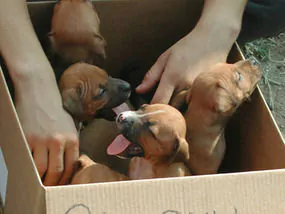Puppy farming
IT WAS the eyes you noticed first: pleading and pathetic. the tiny furry bundles were huddled together in the back of an estate vehicle at a car boot sale. there was a water bowl – the contents of which had been spilt – next to them and one pup was licking the remains from the shabby bit of carpet on which they were lying. whimpering with fear or hunger, it was difficult to tell which, these puppies were not the bouncing balls of fun one would expect to see…
By Bonnie Estridge
IT WAS the eyes you noticed first: pleading and pathetic. the tiny furry bundles were huddled together in the back of an estate vehicle at a car boot sale. there was a water bowl – the contents of which had been spilt – next to them and one pup was licking the remains from the shabby bit of carpet on which they were lying. whimpering with fear or hunger, it was difficult to tell which, these puppies were not the bouncing balls of fun one would expect to see.
Despite the back of the car being open with no one paying much interest in them they seemed too lethargic to escape. With summer approaching car boot sales across the country will be major outlets for the products of “puppy farming” and many will feature adorable-looking creatures that people will find it hard to walk past.
However, according to leading animal welfare organisations, the temptation to buy should be resisted because such purchases will merely fund a horrifying and illegal trade in which dogs are bred for profit only and forced to endure often appalling living conditions. the dogs do not necessarily live on farms – the word “farm” merely refers to anywhere that continuously breeds dogs for profit only.
The dealers sell them via pet shops, classified ads, on the internet and at car boot sales. the Kennel Club recommends only buying puppies from breeders which are registered with it and, because of the terrible problems that arise from the way in which farmed dogs are bred, is desperate to raise awareness in potential dog owners who usually have no idea that this cruel trade goes on.
So-called pedigrees from illegal breeders often sell for the same price as the Kennel Club ones (£600) 
because documentation from bonafide breeders has been forged. type in “puppy farms” or “puppy trafficking” online and you will find distressing videos of pups kept in filthy conditions in the UK, the mother nursing up to a dozen at a time, the animals often just walking round in circles in squalid conditions.
All of this stress, poor breeding and inadequate socialisation causes physical and behavioural difficulties.
the female dogs are kept for breeding only and will be pregnant frequently, often before they are a year old (which
is also illegal). They give birth until they cannot have any more offspring and then are invariably destroyed.
at a reputable establishment the females would have only one litter a year until the age of six but in the
case of farming many will be forced to mate beyond this age.
Once ready for sale the puppies, which are often less than eight weeks old (the minimum age they should be taken from their mother), are packed into crates and transported in trucks to pet shops and private sellers across the country. angelique Davies, spokesperson for the UK animal welfare organisation Four Paws, says: “Many people are unaware that by buying a puppy from a car boot sale or pet shop or through an advertisement online they can be supporting the result of factory-style farming where pups are crammed into kennels, often fed just enough to survive and not given veterinary care. “Conditions on these puppy farms are sometimes so filthy – the animals suffer from vomiting, flea infestations, constant diarrhoea and diseases that cause hearing and heart problems when they’re older.”
Puppy farming is nothing new but it is illegal and local authorities have the power to close these places down.
In reality that happens rarely. Dog behaviourist and obedience trainer Stan Rawlinson, who is known as
Doglistener, says that a number of puppy farms buy in litters from Wales. “they give out fictitious pedigree
certificates”.
“Most of the dogs from these farms are in poor condition and often end up with severe behavioural problems
because of their early upbringing and handling”.
“I have to sort out the serious behavioural problems from both of these places and the local vets have to sort out the medical problems. It is a national disgrace that such outlets still have licences and in my opinion it shows a level of idiocy from the local councils that issue the licences.”
Prospective buyers are seldom invited to the original puppy farm premises to inspect litters as the (usually untrace- able) person who sells them may have outlets far away from the farms. this means people have no idea where they came from and what conditions they have been kept in.
If you see an advertisement (usually online) showing a wide variety of breed types this often indicates that the advertiser is ordering the puppies in, perhaps from a puppy farm in the Republic of Ireland where there is no legislation to prevent, control or monitor the breeding of dogs.
Wales is also a known area for such trafficking but many outlets are found across england too. wherever the puppies originate from the result is the same and they are likely to end up in unlicensed pet shops or more disturbingly at the car boot sales.
Stan Rawlinson has seen puppies, sometimes as young as five weeks, at boot sales. “I’m not suggesting the
organisers were complicit or even aware of the fact but these markets should be better controlled. I’ve
even seen gypsies selling pups out- side the Thursday market at Kempton Park racecourse. They weren’t
in the actual market but were approaching people in the car park to buy Staffordshire-cross pups.”
Often dogs have been cleaned up so as to appear to be in better condition than they are and it is only when
they have been taken home that the problems arise.
Another problem with puppy- farmed dogs is they are rarely touched by humans during early life. “It’s a known fact that if pups are handled during the first two weeks they mature and grow quicker. They are more resistant to infections and diseases, are generally more stable, handle stress better, are more exploratory, curious and learn much faster than pups that are not handled during this
period,” says Rawlinson.
Lack of human contact coupled with the fear of being crammed into boxes and transported for hours during the crucial five to 10-week period is probably the cause of stress-related behaviour.
Under the Breeding And Sale Of Dogs (Welfare) Act (1999) it is illegal for a keeper of a breeding establishment to sell a dog less than eight weeks old other than to the keeper of a licensed pet shop. Local authorities, from which licences are obtained, must ensure mammals are not sold at too early an age.
“Rather than think that you would be kind in giving these poor pups a home, don’t fuel these despicable people’s trade,” says Angelique Davies. “Don’t buy from markets, unlicensed pet shops or from the internet because of that.
Going to a shelter or rescue centre is a far better idea because the dogs will have been medically checked and
vaccinated. Ultimately, you would be doing a far better – and kinder – service to the puppies by reporting
these people to the authorities. We have to try to stop this desperately cruel trade once and for all.”
l www.fourpawsanimalrescue. org.uk; www.doglistener.co.uk






